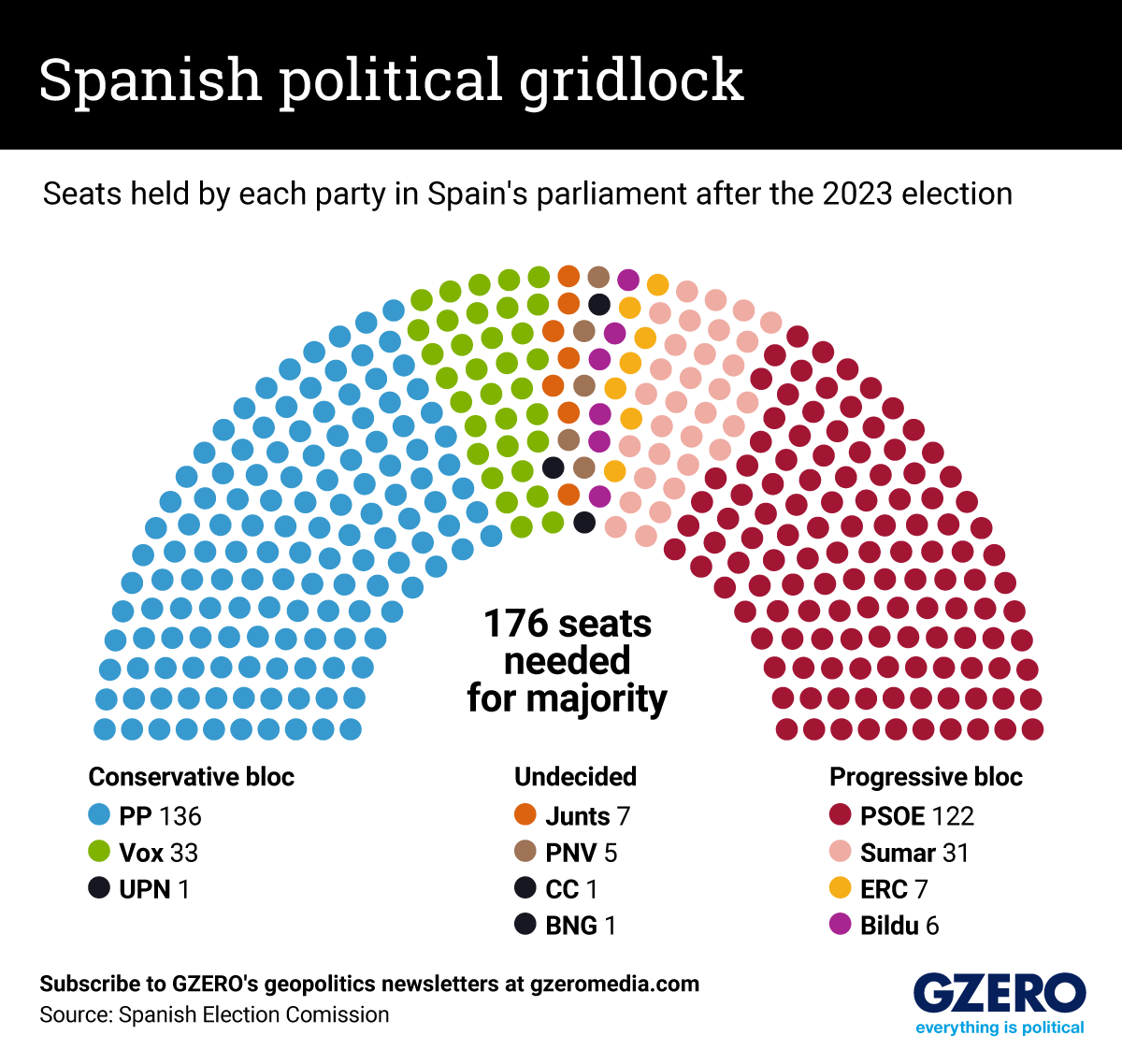July 24, 2023
Spain's snap election on Sunday yielded another hung parliament, which means no party or coalition has a majority of seats to form a government. So, what might happen next?
Here are four scenarios, ordered from most to least likely.
#1 — Election redo. In the coming days, King Felipe VI will ask the leader of the party with the most seats in parliament to try to form a government. That would be Alberto Núñez Feijóo from the center-right People's Party, which came in first with 132 out of 350 MPs.
Unfortunately for Feijóo, the PP and the far-right Vox Party together failed to win an outright majority. The same goes for PM Pedro Sánchez from the left-wing PSOE party, who also doesn't have enough votes along with the far-left Sumar (Add) coalition backed by two Catalan and Basque progressive separatist forces.
If no candidate gets an absolute majority in the first round, the second round only requires a simple majority (more yes than no votes). And if no government is formed two months after the first vote, Spain's constitution mandates going to the polls again, as the country has done twice following similar parliamentary messes in 2015-2016 and 2019.
#2 — Left-wing coalition government. The current left-wing coalition government (PSOE + Podemos, or We Can, now rebranded as Sumar) could stay in power if Junts (Together), a right-of-center Catalan secessionist party, votes for Sánchez in the first round or abstains in the second round. But negotiating with Junts top honcho Carles Puigdemont might prove toxic for the PM.
In case his name doesn’t ring a bell, the shaggy-haired former Catalan president is a fugitive of Spanish justice since Oct. 2017, when he fled to Belgium after unilaterally declaring independence following a sham referendum. You can bet that in exchange for his seven votes, Puigdemont will demand that Sánchez allow the restive region to hold a (legal) plebiscite — a political death sentence for any Spanish prime minister.
Still, the self-proclaimed martyr for Catalan independence might settle for a return home if all charges against him are dropped. This would have been unthinkable for anyone but Sánchez, who already pardoned the Catalan politicians who tried to secede with Puigdemont, and watered down the crime itself.
#3 — Center-right minority government. This one is a bit of a stretch, but the numbers do add up. Feijóo could try to cobble together a razor-thin majority of votes by wooing the moderate Basque Nationalist Party, or PNV, a traditional post-election kingmaker for both the PP and the PSOE.
To do so, though, the PNV will probably ask for the PP to govern alone. In other words, without Vox, a hard-right party that wants to strip not just the Basque Country but all Spanish regions of their autonomy and recentralize power in the national government. It'll also be a tough pill to swallow for Vox, whose voters might prefer to take their chances in an election redo over backing Feijóo pretty much for free.
#4 — Grand coalition. Imagine the PP and the PSOE taking one for Team Spain by setting aside their many differences to form a coalition government that would represent almost two-thirds of Spaniards who voted for either party. It's been done many times in Israel and most recently in Germany.
But alas, not in Spain, where Feijóo and Sánchez would rather keep voting over and over again than work together. As the popular Spanish saying goes, Es lo que hay (It is what is).
More For You
Most Popular
- YouTube
In this Quick Take, Ian Bremmer reacts to President Trump’s State of the Union address, calling it “a rehashing of the greatest hits” with little new policy direction.
Small business hiring surged 7% above the 2024 average in December, led by a surprise rally in retail. But with uncertainty still historically high and mounting concerns over tariffs, can this momentum survive 2026? Explore the data behind the resilience of the US small business sector. Get the latest economic insights from Bank of America Institute.
© 2025 GZERO Media. All Rights Reserved | A Eurasia Group media company.
